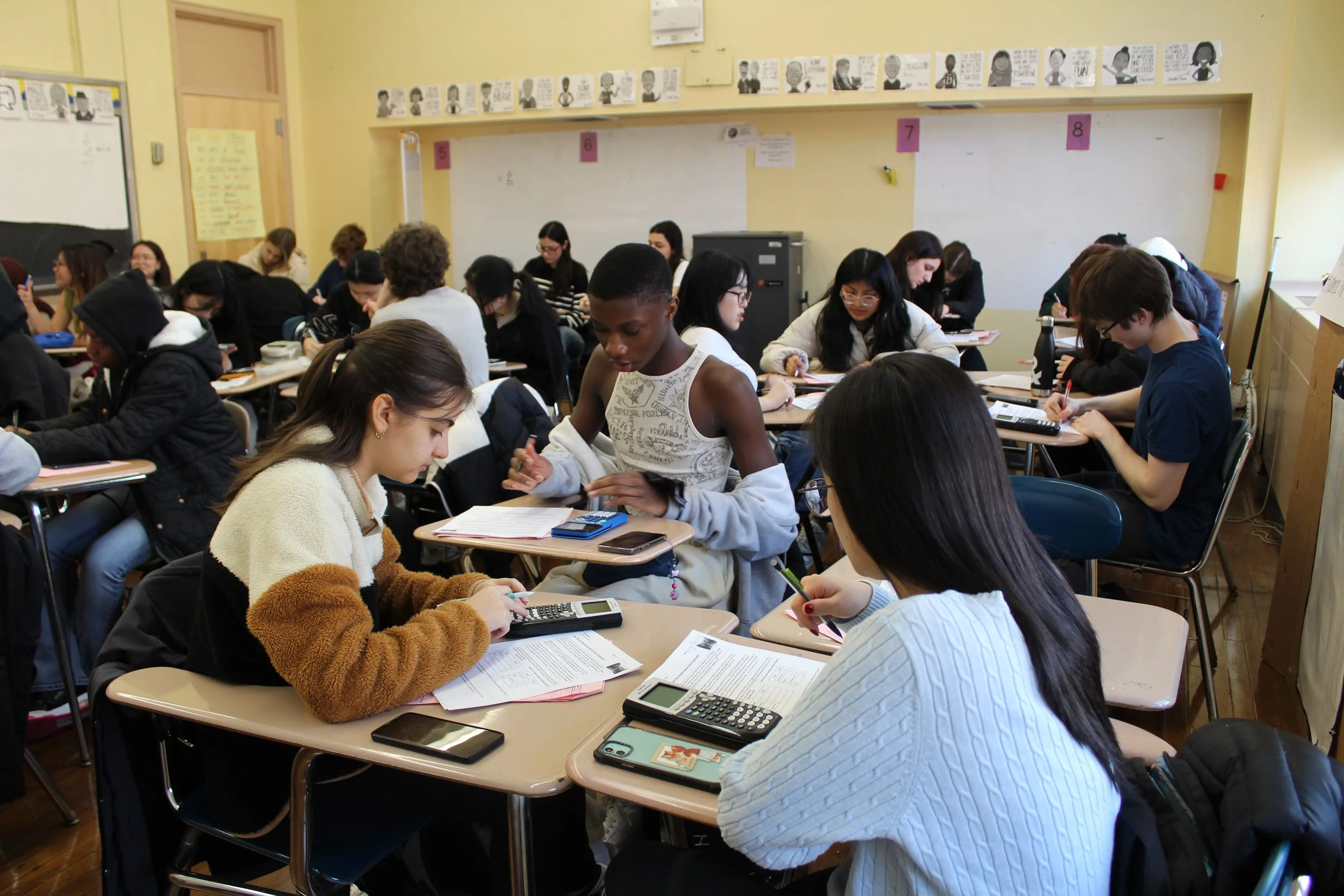What Are the Hardest and Easiest APs?
About 37% of AP Statistics students nationwide earn a four or five on the exam. Photo: Caroline Pychynski
By BRENIECE NG and COURTNEY HODGE
Which AP courses are right for you? While some are seemingly less intimidating than others, deciding what to pick comes as a stressor within itself.
Advance Placement (AP) classes are college level courses that high school students can take to strengthen their resumes, possibly earn college credit, and potentially boost their GPAs.
Currently, Midwood offers over 20 different AP courses, from AP Calculus to AP Biology to AP English Language and Composition, AP Physics, AP Psychology, AP United States History, and more.
A three or higher on an AP exam is considered a passing grade, but many colleges only accept a four or five (the highest score) for course credit. Ivy League colleges like Harvard often require a five to earn credit. However, at a SUNY like Stony Brook, some courses need a three or higher while others need a four.
Some AP tests seem to be a lot harder than others. According to the College Board, less than 50% of students in the U.S. receive a three or higher in AP U.S. History, AP Government, and AP Physics 1. Meanwhile, over 80% of students receive a three or higher in AP Research, AP Seminar, and AP Spanish Language.
Irena Beznos ‘25 said, "Personally, AP Seminar was the easiest test, but it all comes down to time management because this isn't a class where you can simply cram everything the night before."
“[AP Seminar] was simple because of my background in presentations and writing,” said Kezia Smith ‘24, who earned a four on the exam. Though getting a three on the test is not too challenging, nationwide only 31% of exam takers received a four or higher.
Midwood’s AP English Language and Composition class consists of a lot of nonfiction works and writing that follows specific rubrics, but it “wasn’t really all that bad” as the workload was not too intense, said Addan Qaiser ‘24.
“We touched on a variety of subjects, but it was mainly writing research-based essays, and designing and giving presentations individually and in groups," said Beznos, who was also in the class. “I got a four on the exam and overall I would say it was relatively fair because we had been preparing for it all year long.” Nationwide, 30% of AP Lang students get a four or five, suggesting it is tougher than average.
The AP Human Geography course also seems to be difficult as it covers population trends, migration, culture, governance and more. Across America, many students struggle, with 32% scoring just a one on the test.
It is not based on “memorizing dates and events” but more on understanding vocabulary to apply to concepts on free-response questions (FRQs), said Beznos.
AP World History’s level of difficulty is in the middle, students said, as it requires you to analyze historical context and trends, making connections between different historical periods and regions around the world.
“Honestly, it's [all about] the teacher and how you are being introduced to the material,” said Winnie Lin ‘25. “It isn't an easy class, but having Mrs. Monica Ioffe as my teacher, who gave us note packets and continuous practice with helpful strategies and tips for our AP exam, made taking the class less stressful.” For the country as a whole, 64% of students got a three or above on this test.
What about some of the others?
“I consider AP Psychology to be moderately ranked based upon level of difficulty,” Joyce Wong '24 said. The statistics agree, with 40% percent of exam takers receiving a four or higher on this one.
“The content taught in this course was engaging and relatable,” Wong added. “We explored studies on behavioral development, mental processes, psychological disorders, and more. The AP exam consisted mostly of stats and a few key concepts, but I prepared well enough to get a five. Overall, I recommend this class to those with an interest in psychology.”
“AP Lit (English Literature and Composition) was manageable,” said Nimra Mughal ‘24. “It wasn’t time consuming or too hard for me. We read tons of literary works from passages to poetry, analyzed texts, and wrote essays, but through it all I was able to expand my reading skills, and I’m able to take that with me afterwards. Personally, I thought the exam was not as difficult as people made it seem.”
On the other hand, U.S. History seems to be one of the hardest APs to crack. The information is so extensive that it can be difficult to remember everything, and only 25% of the nation’s test takers receive a four or above.
The APUSH test gives students three hours and fifteen minutes to complete everything, including its multiple choice, short answer, and two essay questions. It’s “not enough time to write two essays,” Mughal said.
Sherry Lin ‘24 earned a three on the AP Physics I exam, another tough one. In her experience, it consisted mostly of concepts from the Regents semester but once students reach the “newer units like rotational motion,” that’s when things get harder.
“The work and material gets really hard, but if you have good classmates like I did it’ll make it less challenging,” said Lin. “Dr. [Stephan] Riemersma encourages group work and just talking together in general.”
Try googling “College Board AP Score Distributions” to get more information on how hard each of these tests are – though keep in mind that some courses only attract the highest performing students and may be tougher than they appear based on students’ average results. And remember that with the vast options offered at Midwood, there is a good AP match for anyone who’s up for a challenge.

